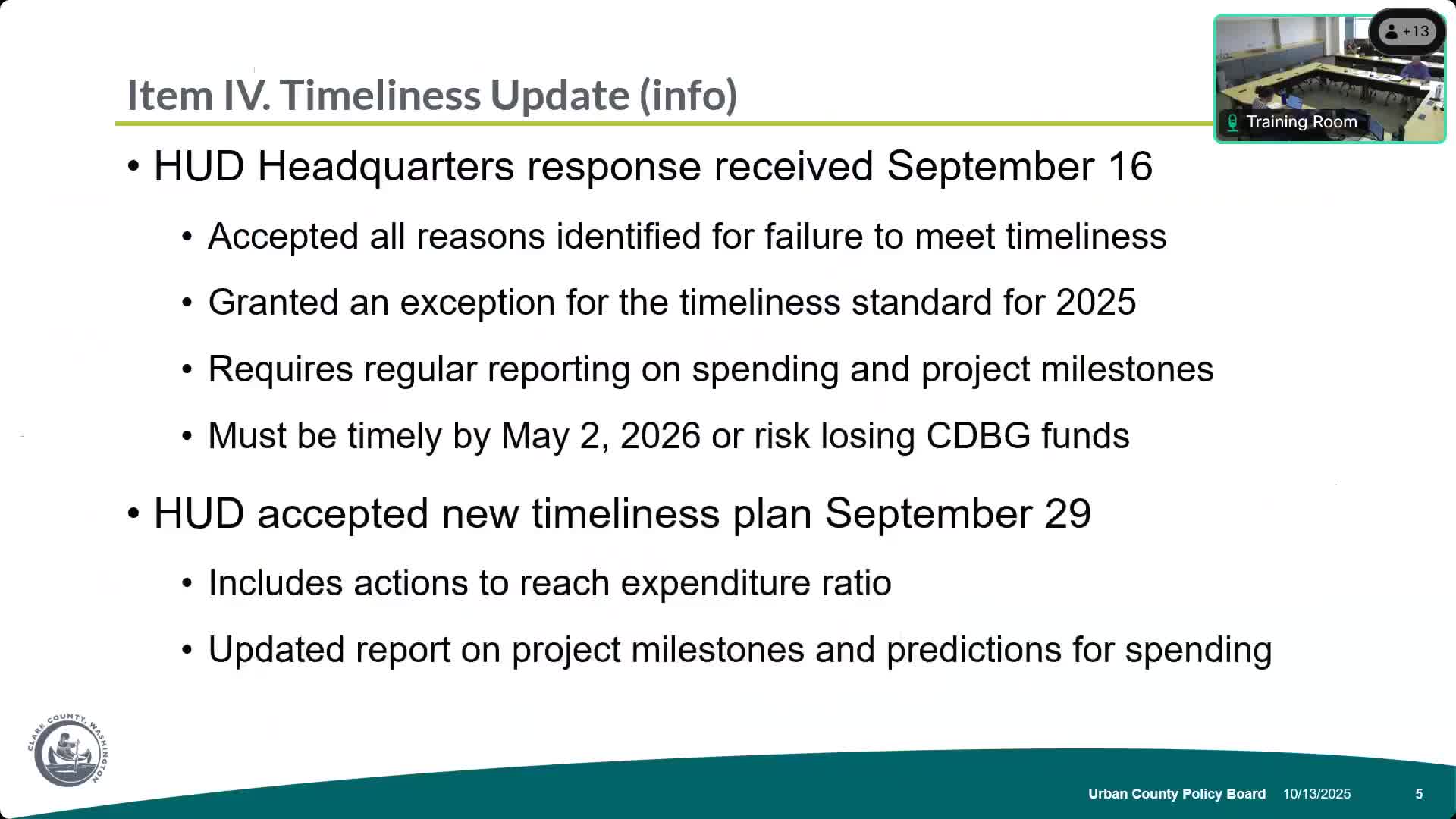Urban County Policy Board approves CDBG reallocations, emergency funding to meet HUD timeliness test
Get AI-powered insights, summaries, and transcripts
Subscribe
Summary
The Clark County Urban County Policy Board approved several funding moves Oct. 13 to address a HUD timeliness exception and reduce the risk of losing CDBG entitlement funds, including a $300,000 reallocation to the housing preservation program and one-time allocations to TBRA programs.
The Clark County Urban County Policy Board on Oct. 13 approved a package of funding changes designed to improve the county’s Community Development Block Grant (CDBG) timeliness and avoid potential federal penalties.
Michael Torres, program manager for Clark County Community Services, told the board that HUD had accepted the county’s reasons for delayed spending and granted an exception for 2025, but that the county “must be timely by 05/02/2026 or we will be at risk of losing the CDBG funds.”
The board approved three staff recommendations and several related motions intended to increase near-term spending and close the gap to the HUD timeliness threshold. The largest single action approved was a motion to reallocate $300,000 in program year (PY) 2024 CDBG funds from the Battle Ground North Parkway sidewalk project to the county’s housing preservation program. Mayor Matt Cole moved that reallocation and a board member seconded; the motion passed without recorded opposition.
Why it matters: Clark County must reduce its CDBG fund balance to meet HUD’s expenditure ratio test. If the county remains untimely by the May 2, 2026 deadline, HUD could reduce or suspend the county’s annual CDBG entitlement. Torres said staff estimate the county remains roughly $500,000–$600,000 short of the timeliness target and that the approved moves “would be a significant increase” toward meeting the standard.
Details of approved measures
- Reallocate $300,000 from the North Parkway sidewalk project to the housing preservation program. Staff said this requires a substantial amendment to the 2024 action plan and a 30-day public comment period before additional spending begins. The board also directed staff to post an addendum to the current NOFA to notify applicants that public facility/neighborhood improvement applications will not be funded in this round.
- Make a one-time additional allocation to the PY2024 tenant-based rental assistance (TBRA) programs from program income. Staff estimated the allocation would be up to roughly 30% of current TBRA awards (about $55,000) and said program income from loan repayments is available to cover it.
- Modify the scope of CDBG funding for Bertha’s Shelter so funds previously committed for roof, windows and siding instead prioritize the roof and a solar installation. Staff said the change does not increase the total funding for the project but shifts expenditures to items that can proceed under current timelines and weather windows.
Additional vote actions tied to timeliness and program operations
- The board approved a $90,000 additional award to Lifeline Connections’ HOME-funded TBRA program (this item had been discussed at the Sept. 8 meeting but returned for reconsideration after that meeting lacked a quorum). Staff said program income is available to cover the request and that the funds would prevent households from being displaced.
- The board approved raising the annual set-aside for the housing preservation program from $250,000 to $400,000. Staff explained the program was converted from loans to grants to better serve the target population (primarily very low-income homeowners, often seniors) and to facilitate faster spending.
- The board approved updates to the Urban County funding guidelines to reflect the program changes, including adding public services as an eligible activity in the current consolidated-plan cycle and aligning application deadlines with the City of Vancouver’s timeline.
Attribution and next steps
Torres and other staff said some actions (notably the $300,000 reallocation) will require a formal substantial amendment and a 30-day HUD public comment period before funds can be spent. Torres said staff have notified project managers to accelerate work and that the county has already submitted a revised timeliness plan to its HUD representative.
Staff will report back on the outcomes of the public comment period and on updated spending and milestone reports as part of the county’s regular HUD reporting. The board’s approvals were procedural actions to allow staff to proceed with amendments, contract modifications and program adjustments needed to increase near-term expenditures.
